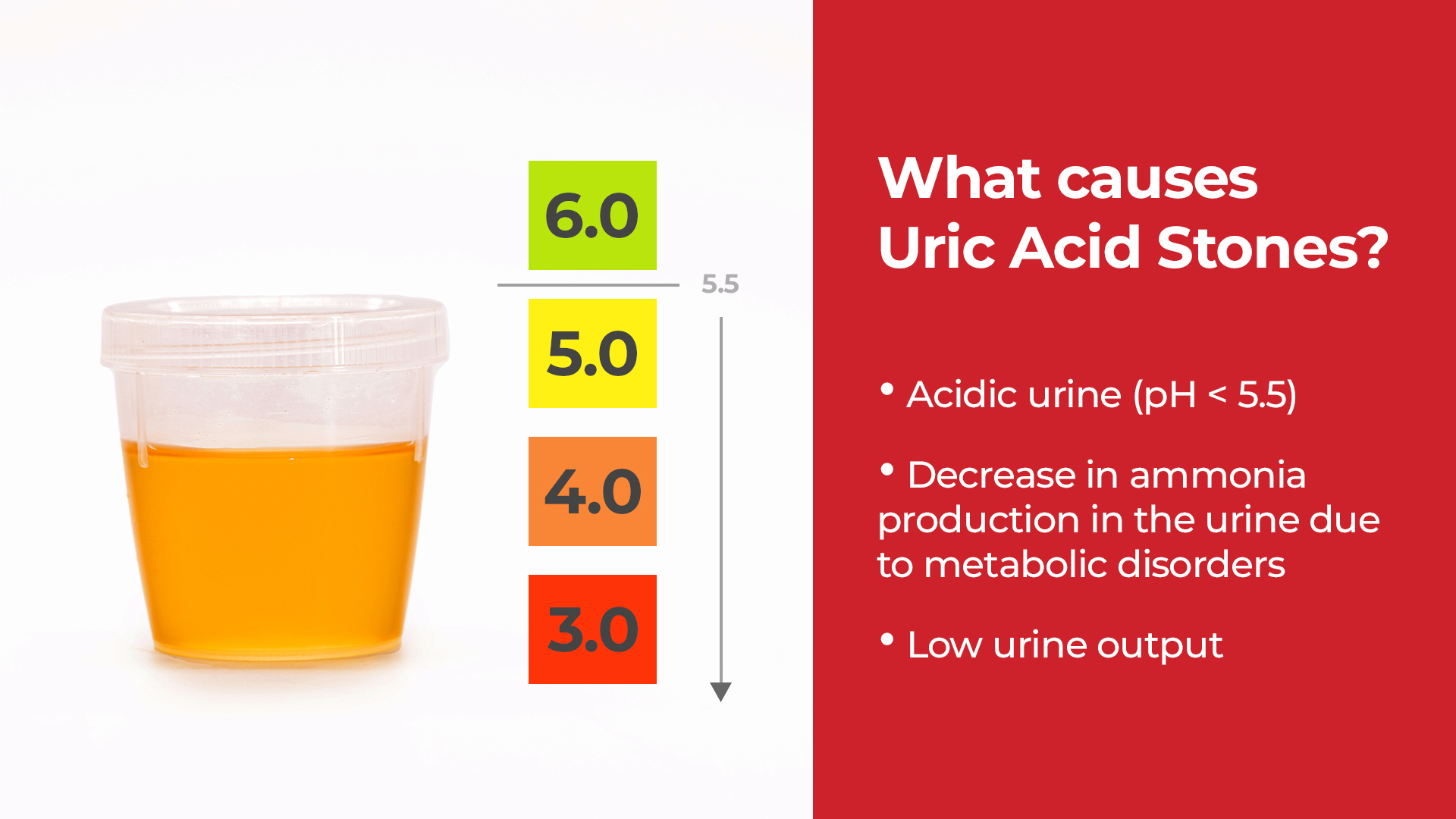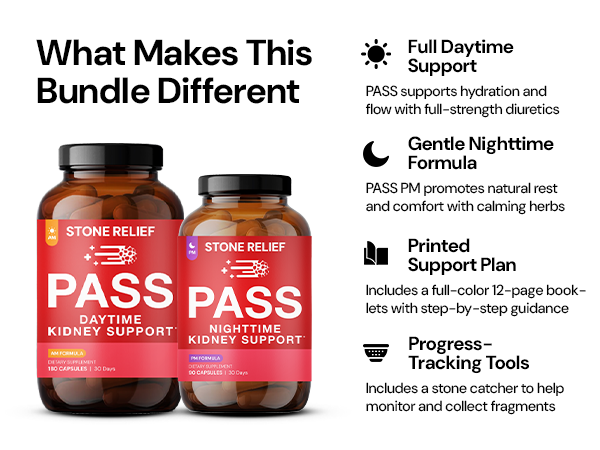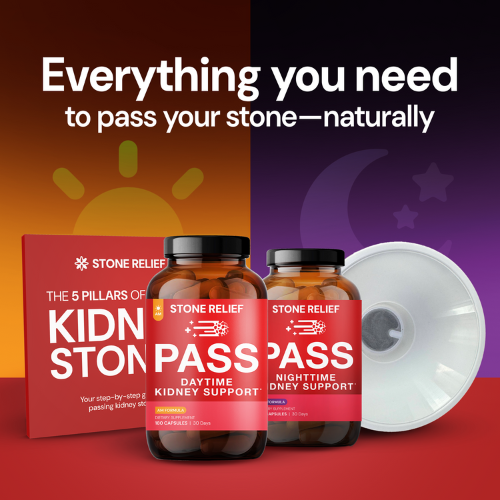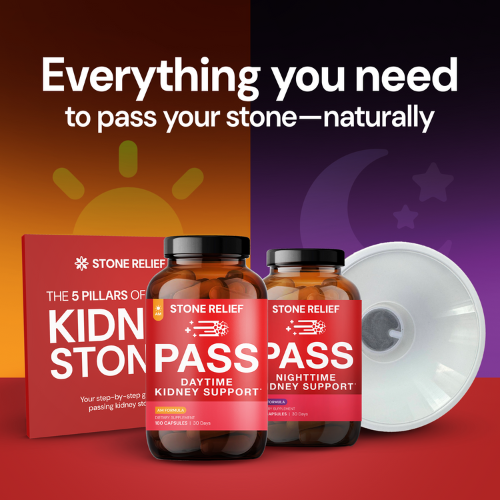High Uric Acid Kidney Stones Explained
There’s a lot of confusion around what really causes high uric acid kidney stones. While most people blame elevated uric acid, the real trigger is consistently acidic urine. In this blog, we explore why urine pH is more important than uric acid levels and what lifestyle choices drive this condition.
Key Takeaways
-
High uric acid alone won’t cause kidney stones
-
Acidic urine (pH < 5.5) is essential for uric acid stones to form
-
Metabolic dysfunction and insulin resistance lower urine pH
-
Urine pH control is the most effective strategy for prevention
Uric acid kidney stones are the second most common stone type, and unfortunately, they’re also one of the most misunderstood.
Many people (including doctors) focus entirely on elevated uric acid levels as the cause of these stones. But that’s only part of the story—and frankly, not the most important part.
So if you’ve been told to worry about your uric acid numbers alone, this blog is for you.
Let’s Set the Record Straight
Yes, high uric acid (hyperuricemia) plays a role in kidney stone risk. But the truth is, acidic urine is the non-negotiable condition for uric acid stones to form.
In fact, you could have sky-high levels of uric acid in your system and still never form a stone—if your urine pH stays above 5.5.
Uric Acid Stones by the Numbers
-
Account for 10–15% of all kidney stones
-
Predominantly affect older men (60–65+)
-
Linked with metabolic dysfunction, alcohol use, and poor dietary choices
-
Measured through a 24-hour urine test (ideal uric acid excretion is <600 mg/day)
🛒 Check Price & Purchase Stone Relief Pass AM/PM Bundle on Amazon
What Is Hyperuricosuria?
Hyperuricosuria means your body is excreting too much uric acid in the urine.
Levels above 600 mg/day are considered elevated, and it’s often accompanied by increased sodium urate—another compound that raises stone risk.
This condition is a piece of the puzzle, but it’s not the one you need to focus on most.
So What Actually Causes Uric Acid Kidney Stones?
Let’s go deeper.
Two things must happen for a uric acid stone to form:
-
Elevated uric acid (hyperuricosuria)
-
Acidic urine (pH less than 5.5)
Without acidic urine, stones simply won’t form, no matter how much uric acid is floating around in your body.
That’s why urine pH is the most critical factor.
Common Drivers of High Uric Acid and Acidic Urine
Let’s break down the culprits that influence both uric acid levels and urine acidity.
1. Metabolic Dysfunction
This is the biggest factor, and it’s caused by:
-
Poor diet
-
Ultra-processed foods
-
Refined carbohydrates
-
Industrial seed oils
Metabolic dysfunction is everywhere—87% of the Western population has some form of it. It leads to insulin resistance, which in turn affects how your kidneys process waste and regulate urine pH.
2. Alcohol Consumption
Too much alcohol can spike uric acid levels and alter kidney function.
Moderation matters:
-
No more than 2 drinks per day for men
-
1 drink per day for women
3. Certain Medications
Drugs used for blood pressure, blood sugar, and gout can contribute to hyperuricosuria. Always speak with your healthcare provider before making changes to medication, but it’s important to understand how these affect your kidneys.
4. Type 2 Diabetes and Insulin Resistance
Type 2 diabetes affects over a third of Americans, and another third are prediabetic.
The common thread? Insulin resistance.
When your body doesn’t respond properly to insulin, it reduces the amount of ammonium excreted in the urine. Ammonium is a natural alkalizer, so when it’s low, your urine becomes more acidic.
And that’s when the problems begin.
Low ammonium = acidic urine = higher risk of uric acid kidney stones.
🛒 Check Price & Purchase Stone Relief Pass AM/PM Bundle on Amazon
Acidic Urine Affects More Than Just Uric Acid Stones
While we’re focused on high uric acid kidney stones, it’s important to note that acidic urine also increases calcium oxalate stone formation.
So if your urine pH is too low, you’re at risk for multiple stone types—not just uric acid.
What Can You Do?
If you’re struggling with uric acid kidney stones, stop focusing solely on uric acid levels.
Instead, take control of your urine pH.
Here’s how:
-
Test your pH regularly (aim for above 6.0)
-
Adopt a species-appropriate diet—focus on meat, healthy fats, and minimal fruit
-
Eliminate processed foods and seed oils
-
Stay hydrated with 3 liters of water daily
-
Avoid alcohol or limit it sharply
Fixing Your Diet = Fixing Your Stones
Everything comes back to food.
You can’t fix metabolic dysfunction with pills. You can’t alkalize your urine by drinking baking soda forever.
But you can reset your system with the right food—and I know because I’ve done it.
After 15 years of trial and error, I haven’t had a single kidney stone in over five years.
🛒 Check Price & Purchase Stone Relief Pass AM/PM Bundle on Amazon
Final Thoughts: It's Not Just About Uric Acid
Yes, high uric acid contributes to stone formation.
But acidic urine is the gatekeeper.
If your urine is acidic, your risk skyrockets. If it’s not, even elevated uric acid won’t cause stones.
That’s the truth most people (and most doctors) miss.








